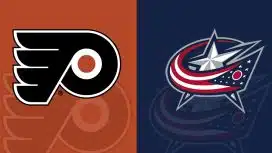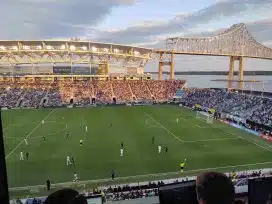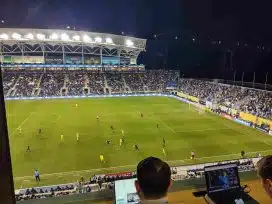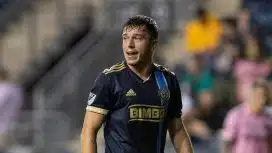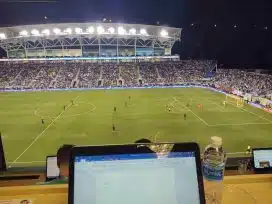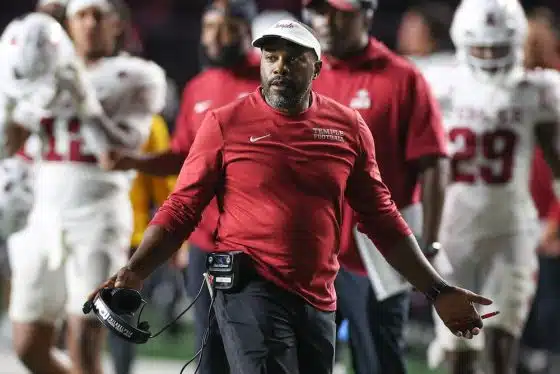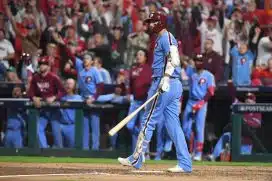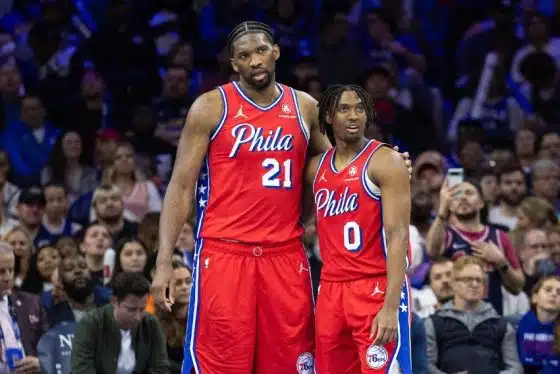Writer: Kevin Durso
Eric Desjardins: A blue line legend for Flyers
In the 70s, for the two Stanley Cup celebrations, it was Barry Ashbee. In the 80s, it was Mark Howe. In the 90s and early 2000s, it was Eric Desjardins.
The three have shared the common bond of being the defensemen that defined an era of Flyers hockey. On Thursday night, prior to the Flyers game against the Buffalo Sabres, Desjardins will take his place among the Flyers legends as he enters the Flyers Hall of Fame.
It started with the trade that defined the 90s for the Flyers. They already had one Flyers 2014-15 Hall inductee, Eric Lindros, acquired in a trade in 1992. On Feb. 9, 1995, they added John LeClair and Desjardins to the fold in a blockbuster trade with the Montreal Canadiens.
LeClair and Desjardins had already been to the promised land, winning a Stanley Cup in 1993 with Montreal. In Game 2 of the Stanley Cup Final against the Los Angeles Kings, it was Desjardins that scored the game-winning goal in overtime to cap a hat trick in Montreal's 3-2 win.
Desjardins, affectionately known as 'Rico' by teammates and fans, arrived in Philadelphia during the 1994-95 season and had 23 points in 38 games. That was the beginning of a dominant career in Philadelphia.
Desjardins won the Barry Ashbee Memorial Trophy – awarded to the Flyers best defenseman – for six consecutive seasons from 1995 to 2000. He was an All-Star in both 1996 and 2000 and a member of Team Canada in the 1996 World Cup of Hockey and the 1998 Olympics.
During the 1999-00 season, a season where he posted a career-high 55 points, Desjardins was named the 12th captain in Flyers history, succeeding Lindros. He would hold captaincy for the remainder of season and the entire 2000-01 season before Keith Primeau was named captain in October 2001.
As the Flyers made a bid for the Stanley Cup in the 2003-04 season, Desjardins was a spectator. He missed a majority of the season and all of the playoffs with an injury.
Even without participating in the 03-04 Cup run, some of Desjardins finest moments as a Flyer came in the playoffs. In the 1995 Eastern Conference Semi-final, Desjardins scored the overtime winner in Game 1 of an eventual series sweep of the Rangers. In the Flyers run to the Stanley Cup Final in 1996-97, Desjardins had 10 points in 19 games. He had 12 points in 18 games in the team's playoff push in 1999-00, as they fell short of reaching another Final against the Devils in the Eastern Conference Final.
Desjardins' final season came following the NHL lockout in the 2005-06 season. He scored four goals and added 20 assists for 24 points in 45 games in the regular season and scored one goal and added three assists as the Flyers were defeated by the Buffalo Sabres in six games in the East Quarterfinals.
The Flyers did not offer a contract to the veteran defenseman following that season and he chose to retire with the Flyers prior to the 2006-07 season.
In his career, Desjardins played 1,143 games in 18 NHL seasons, scoring 136 goals and adding 439 assists for 575 points. With the Flyers, he played 11 seasons and 738 games, scoring 93 goals and adding 303 assists for 396 points. He ranks second among all Flyers defensemen in goals, assists and points, trailing only Howe.
Overall, this was not only a staple of the defense for over a decade, this was a legend and fan favorite who gave his all in every game he played. By the time it all came to an end, Desjardins had left everything on the ice and that is why he takes his place among the other legends.
For Flyers fans who grew up with the teams of the 90s, Desjardins is as synonymous with the era as Howe and Ashbee were to the decades in which they played. Those two legends not only have their names on the Hall of Fame banners, but their numbers hanging from the rafters.
Desjardins may never have his number retired by the Flyers, but chances are we'll never see another player like Desjardins wearing No. 37.
Below is a tribute video from 2006-07 the Flyers used to honor Desjardins after his retirement.
Kevin Durso is managing editor for Flyerdelphia. Follow him on Twitter @Kevin_Durso.













